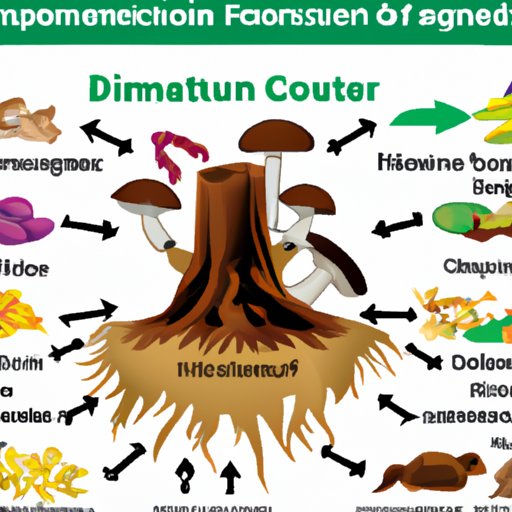Introduction: What are Decomposers?
Decomposers are organisms that break down organic matter in an ecosystem. They play a vital role in the natural cycle of life by releasing essential nutrients back into the soil. Without them, our environment would be unable to function properly.
A. Definition of Decomposers
Decomposers are organisms that feed on dead or decaying organic matter. They are found in all ecosystems, from aquatic environments to terrestrial ones. They get their energy from breaking down complex molecules into simpler ones, which can then be used by other organisms in the food chain. Examples of decomposers include bacteria, fungi, earthworms, and some invertebrates such as millipedes and slugs.

B. Role of Decomposers in the Ecosystem
The role of decomposers in the ecosystem is to break down organic matter, such as leaves, plants, and animals, into simpler substances like carbon dioxide and water. This process is known as decomposition and it releases essential nutrients, such as nitrogen and phosphorus, back into the soil. These nutrients are then taken up by plants, which in turn provide food for other animals in the food chain. The cycle is complete when the animals eventually die and are broken down by decomposers once again.
How Decomposers Help to Cycle Nutrients in Nature

A. Process of Nutrient Cycling
Nutrient cycling is an important part of nature’s balance. In a healthy ecosystem, nutrients are recycled from one organism to another. Plants take up essential nutrients from the soil and use them to grow. Animals then eat the plants, and the nutrients are passed through the food chain. Eventually, the nutrients are released back into the soil when the animals die and are broken down by decomposers.
B. How Decomposers Aid in the Cycle
Decomposers are essential to this cycle because they break down the dead matter and release the nutrients back into the soil. Without them, these nutrients would not be available for new plants to absorb. According to a study by the University of California, “Decomposers are key players in the global cycling of carbon, nitrogen, and other elements, and they affect the abundance of greenhouse gases in the atmosphere.”
What Types of Organisms are Considered Decomposers?
Organisms that are considered decomposers include bacteria, fungi, earthworms, and some invertebrates such as millipedes and slugs. Bacteria are microscopic organisms that are found everywhere in nature and are responsible for the majority of decomposition. Fungi also play an important role, as they can break down tough materials such as wood and leaf litter. Earthworms, millipedes, and slugs are larger organisms that feed on dead plant matter and help to aerate the soil.

Understanding the Important Job of Decomposers in the Food Chain
Decomposers play a critical role in the food chain by breaking down dead matter and releasing essential nutrients back into the soil. This allows new plants to grow, which in turn provide food for animals. Without decomposers, this cycle would not be possible and the food chain would collapse.
The Significance of Decomposers in Maintaining a Balanced Environment
A. Benefits of a Balanced Environment
A balanced environment is essential for the health of any ecosystem. It ensures that there is enough food for all organisms in the food chain and that essential nutrients are constantly being recycled. A balanced environment also helps to maintain biodiversity, which is crucial for a healthy ecosystem.

B. How Decomposers Help Maintain Balance
Decomposers are an integral part of maintaining a balanced environment. By breaking down dead matter and releasing essential nutrients back into the soil, they ensure that new plants can grow and the food chain remains intact. According to a study by the University of California, “Decomposers are thought to be the most important link between the biotic and abiotic components of an ecosystem.”
Conclusion
Decomposers are an essential part of any ecosystem. They break down dead matter and release essential nutrients back into the soil, which allows new plants to grow and the food chain to remain intact. They also help to maintain a balanced environment by recycling essential nutrients and promoting biodiversity. Without decomposers, our environment would not be able to function properly.
(Note: Is this article not meeting your expectations? Do you have knowledge or insights to share? Unlock new opportunities and expand your reach by joining our authors team. Click Registration to join us and share your expertise with our readers.)
